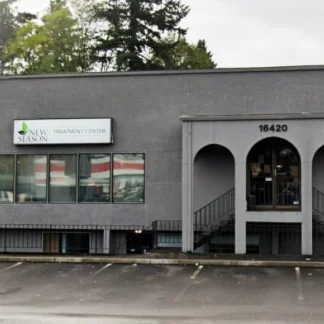Centerstone Behavioral Health
Centerstone Behavioral Health is a public rehab located in Portland, Oregon. Cen...
New Season – Portland Metro Treatment Center is a drug and alcohol rehab located in Portland, OR. They provide outpatient addiction treatment and medication-assisted treatment.
This center offers medication-assisted treatment and an outpatient addiction program for adults with an opioid use disorder.
The main components of the outpatient program are counseling and medication-assisted treatment. Participants can expect individual, group, and family therapy, medically supervised withdrawal, medical exams, and referrals. During counseling sessions, individuals learn why they became addicted, their triggers, and a way to establish a relapse prevention plan.
FDA-approved medications like methadone, buprenorphine, and suboxone are used to lower the potential for drug misuse, decrease physical symptoms, and curb cravings. Medication will be managed as treatment progresses.
New Season accepts private insurance plans including Beacon Health Options, CareOregon, Humana, Magellan, Medicare, Multiplan, and Optum. They also accept PacificSource, Providence Health Plan, Regence, TRICARE, and Trillium Community Health Plan. If you don’t see your provider listed here, be sure to verify your out-of-network benefits with your provider.
Contact us for more information: (503) 762-3130

Connect with New Season - Portland Metro Treatment Center by calling their admissions team directly.
(503) 762-3130 Website Get DirectionsThe Commission on Accreditation of Rehabilitation Facilities (CARF) is a non-profit organization that specifically accredits rehab organizations. Founded in 1966, CARF's, mission is to help service providers like rehab facilities maintain high standards of care.
CARF Accreditation: Yes
The Substance Abuse and Mental Health Services Administration (SAMHSA) is a branch of the U.S. Department of Health and Human Services. Established in 1992 by congress, SAMHSA's mission is to reduce the impact of substance abuse and mental illness on American's communities.
SAMHSA Listed: Yes
Research clearly demonstrates that recovery is far more successful and sustainable when loved ones like family members participate in rehab and substance abuse treatment. Genetic factors may be at play when it comes to drug and alcohol addiction, as well as mental health issues. Family dynamics often play a critical role in addiction triggers, and if properly educated, family members can be a strong source of support when it comes to rehabilitation.
Group therapy is any therapeutic work that happens in a group (not one-on-one). There are a number of different group therapy modalities, including support groups, experiential therapy, psycho-education, and more. Group therapy involves treatment as well as processing interaction between group members.
In individual therapy, a patient meets one-on-one with a trained psychologist or counselor. Therapy is a pivotal part of effective substance abuse treatment, as it often covers root causes of addiction, including challenges faced by the patient in their social, family, and work/school life.
Group therapy is any therapeutic work that happens in a group (not one-on-one). There are a number of different group therapy modalities, including support groups, experiential therapy, psycho-education, and more. Group therapy involves treatment as well as processing interaction between group members.
In individual therapy, a patient meets one-on-one with a trained psychologist or counselor. Therapy is a pivotal part of effective substance abuse treatment, as it often covers root causes of addiction, including challenges faced by the patient in their social, family, and work/school life.
In individual therapy, a patient meets one-on-one with a trained psychologist or counselor. Therapy is a pivotal part of effective substance abuse treatment, as it often covers root causes of addiction, including challenges faced by the patient in their social, family, and work/school life.
Centerstone Behavioral Health is a public rehab located in Portland, Oregon. Cen...
Addictions Northwest is a private rehab located in Gresham, Oregon. Addictions N...
Hand In Hand is a private rehab located in Portland, Oregon. Hand In Hand specia...
Western Psychological and Counseling Services provides mental health outpatient ...